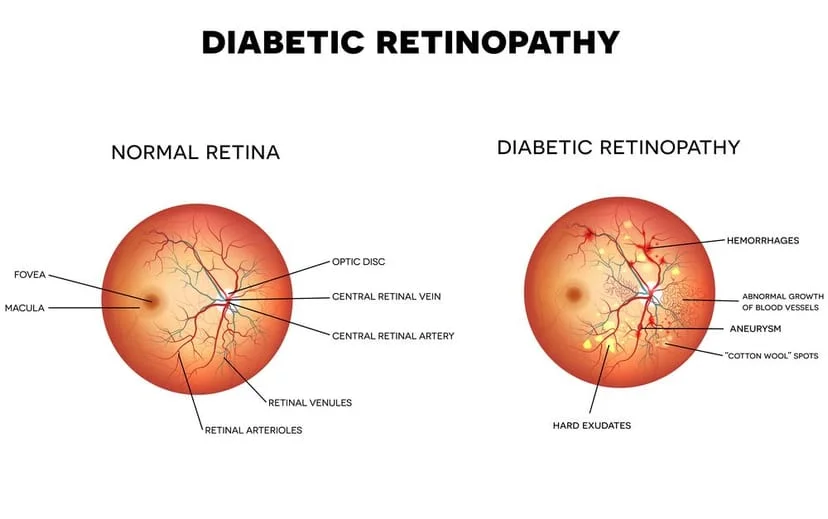Diabetic retinopathy is one of the leading causes of vision loss. At Southwest Retina Eye Center in Odessa, TX, we provide eye exams to determine an accurate diagnosis and provide treatment for this disease to help preserve your vision. Prior to visiting us, take a look at some frequently asked questions about diabetic retinopathy below!
What is diabetic retinopathy?
Diabetic retinopathy occurs when high blood sugar damages the blood vessels in your eyes and causes them to leak blood or fluid within your eyes. As a result, you may experience vison loss.
Who is at risk for diabetic retinopathy?
If you have diabetes, you are at risk of developing this condition. Those with adult onset diabetes, also known as type 2 diabetes, require an annual evaluation once diagnosed with diabetic retinopathy. Individuals with juvenile diabetes, or type 1 diabetes, should be closely monitored for any signs of diabetic retinopathy. However, most people who have this condition have had diabetes for at least 10 years.
How can I prevent diabetic retinopathy?
Visit our ophthalmologist annually and take precautions to keep your blood sugar levels healthy. In addition to taking insulin and eating well, it is important to monitor your blood pressure. If you have hypertension, medication and lifestyle changes can help you maintain a normal blood pressure.
What are some symptoms diabetic retinopathy?
In the early stages, you may have blurred vision or not experience any symptoms. Those with advanced diabetic retinopathy may exhibit blind spots, floaters, and cloudy vision. After a diagnosis, our ophthalmologist can recommend a treatment plan to help manage the condition.
What are the types of diabetic retinopathy?
There are two main types of diabetic retinopathy, nonproliferative and proliferative. Nonproliferative, or early stage diabetic retinopathy, causes damage to small blood vessels in the retina. In proliferative, or late stage retinopathy, you develop abnormal blood vessels, which can cause retinal detachment and scarring. Abnormal blood vessels sometimes leak into the vitreous gel in the retina, resulting in vision loss.
Is diabetic retinopathy curable?
No, diabetic retinopathy is not curable. Treatment can help slow down the progression of the disease, however, vision loss is irreversible. Visiting our ophthalmologist is essential, as early detection can help prevent vision loss.
What retinopathy treatments are available?
It is essential to keep your diabetes and blood pressure under control and visit our eye doctor regularly. We may recommend laser photocoagulation to prevent enlarged blood vessels from leaking and control the growth of new blood vessels. To remove blood from the vitreous humor, you may need a vitrectomy.
Contact us for Treatment Today
If you are experiencing symptoms of diabetic retinopathy, let our team at Contact Southwest Retina Eye Center in Odessa, TX, help. We will create a personalized treatment plan to slow down the progression and preserve your vision. To learn more about diabetic retinopathy or to schedule an appointment, contact us at (432) 333-1324 today.
